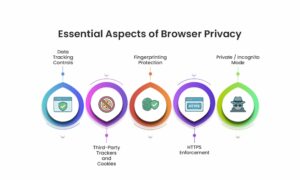The digital space is experiencing unprecedented growth, with innovations happening every day! Every next second, we have doubts and browse the internet. Here is where the browsers come into the picture. Its use extends from simply searching for any query to clicking, shopping, filling forms, and so much more. Thus, data collection stands at the core in this regard, posing a critical concern of digital rights. Alongside this, the browser and online market are highly competitive, allowing big tech firms to dominate.
The future of the internet is clear! Privacy issues, highly competitive markets, and regulatory pressure. The view is quite big! In this article, let us understand browser privacy, its importance, its impact on competition in digital markets, and more.
Let’s get started!
Defining Browser Privacy
Privacy focused browsers keep your entire browsing history, cookies, search history, or other data from being saved on your device. It measures the technology and policies that own websites, advertisers, and bad actors offline by ensuring they do not store any online activity of users. Meaning, you stay anonymous. The privacy browsers come with private browsing mode: “IN cognitive Mode” or “InPrivate.”
Essential Aspects of Browser Privacy
Data Tracking Controls
Browsers mainly capture important information, such as browsing history and interaction, to enhance the user experience or personalize it. Browsers are privacy-focused or prevent the tracking of third parties.
Third-Party Trackers and Cookies
Cookies store data related to a session, and third-party cookies allow advertisers to monitor users across sites. The blocking capabilities of modern browsers prevent these cookies from having a direct impact on the functionality of the ad networks.
Fingerprinting Protection
Fingerprinting uses features such as type of devices, screen resolution, and browser versions to identify the users in a unique way.
HTTPS Enforcement
Privacy browsers have encrypted connections to websites, protecting the websites against packet snatching.
Private / Incognito Mode
Although these modes do not provide complete anonymity, they do not allow local device storage of history, cookies, or temporary site data.
Privacy extensions allow users to have greater control over personal information. However, they also have a colossal impact on the overall economy of digital markets.
The Importance of Browser Privacy in the Booming Digital World
Digital mediums today produce enormous amounts of information which businesses mainly use to customize ads, measure effectiveness, and more. But, on the other side, it comes with drawbacks that cannot be overlooked, such as:
- Data breaches
- Targeted misinformation
- Unwanted profiling
- The unfair advantages of firms having large data ecosystems
Modern consumers are becoming more aware of such dangers. Privacy has stopped being a niche issue and has become a standard expectation. This has pushed browsers such as Google Chrome, Safari, Firefox, and Brave, among others, to compete on the strength of their privacy policies.
The Digital Markets Competition: A Changing Landscape
Competition is standing at the forefront in today’s digital markets. One of the key points to note is competition does not mean companies sharing vast amounts of data; it’s all about that competition with one another in the field. The European Union’s “Digital Market Act” came into effect on 7 March 2024.
The EU aims to make digital markets more competitive and even minded. To accomplish this, it regulates large firms, the so-called big gatekeepers, allowing smaller providers a level playing field and users greater control over what they consume and their data.
Key Actors that are influencing Digital Competition
Google through Chrome, Google Search, Google Video Search, Android, and its advertising system.
- Apple and Safari, iOS, and privacy restrictions.
- Microsoft is using Edge and Windows operating systems.
- Privacy First Firefox Mozilla
- User-controlled alternative search engines include Brave, DuckDuckGo, and more.
The positioning of browsers as the core of online interactions imposes competitive forces on browsers regarding their designs that impact advertising, analytics, e-commerce, and content delivery.
Privacy and Digital Market Competition: How is the Scenario?
Privacy protection and competition are the important concerns in today’s digital economy. Privacy needs to be practiced effectively to keep customers' data safe; however, it impacts the market competition. Thus, there should be a perfect balance maintained between the two:
When it comes to browsers, let’s see how the scenario is:
For instance:
- Smaller and technology firms mainly lack data sources when Safari is blocking third-party cookies.
- The Privacy Sandbox proposed by Google is set to substitute the third-party cookies. However, critics believe that the Privacy Sandbox will only increase the control of Google on advertisements.
- Private browsers such as Brave do not show ads or instead show alternative ads that are privacy friendly.
Privacy guards, therefore, can redefine the advertisement market unwillingly, favoring certain players, and to the detriment of others.
A Word About Market Concentration and Gatekeeping
The browser creators have a lot of control over the sites since they depend on the technologies that are offered by the browsers in use. The popularity of the standards of Chrome is justified by the large market share, efficient privacy controls of Safari that restricts advertisements and analytics of third-party applications, and integration supported by Edge that sustains the ecosystem of Microsoft.
This puts the browser companies under massive control in the spheres of innovation, market entry, and competition.
Policy and Regulatory Impacts:
Some of the laws that governments have tightened in relation to this include:
- GDPR (Europe)
- CCPA (California)
- DMA (Digital Markets Act)
Wrapping it Up!
The competition and privacy of browsers in the digital markets are closely related. Browsers have emerged as the future of the web due to the struggle by companies to defend user information or to curb it, making them formidable gatekeepers to web content. Protective privacy gives consumers greater power, yet it affects competition, advertising economics, and power dynamics among technology giants.
For such insightful articles, visit us here!
FAQs
1] What is web browsing privacy?
Ans: As the name suggests, web browsing privacy refers to the right to know how one's personal information is collected and shared when accessing the internet.
2] What is the Digital Markets Act?
Ans: The Digital Markets Act (DMA) is basically a set of well-defined objectives that help to identify the “gatekeepers.”
Also Read:
Data Recovery After Cyberattacks: A Go-to Guide
Why Data Protection is Important for Your Organization? An In-Depth Guide






